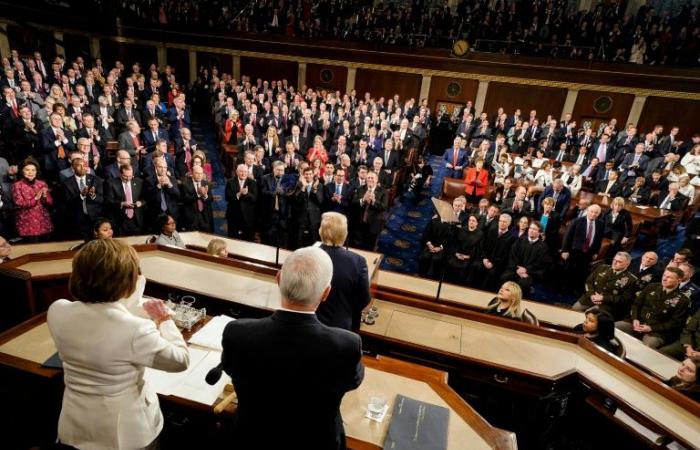Donald Trump attacked his second term to the floor, multiplying the decrees to keep his campaign promises, trying to radically reduce the size of the government and to deeply review the role of America on the international scene.
But, when he has just crossed the symbolic bar of 100 days at the White House, the equation may complicate himself for the American president, who will have to bring together divided Republicans at the Congress to register his policies in the marble of the law and thus constitute a lasting heritage.
“The first 100 days of Trump were remarkable for their pace and their impact. Now comes the difficult part,” warns Stephen Dover, director of the Franklin Templeton Institute, in a memo to investors.
“The next 100 days will be devoted to the challenges to have law adopted while attacking the reduction of the deficit. Congress must act, which implies building parliamentary coalitions,” he adds.
Since his return to the White House, three months ago, Donald Trump has exercised the executive power like no other president in modern history, signing more than 140 decrees to drastically reduce illegal immigration, fight against hate diversity or inclusion programs by the Conservatives and dismantle the federal bureaucracy.
But even the authority of the president has its limits and most of the reforms wanted by the billionaire – in particular those which involve public spending – will have to obtain the approval of the congress.
A test for Donald Trump, whose rating of confidence has plummeted in polls, against the backdrop of concerns for the health of the economy.
– Spirit of consensus –
The decrees signed without the involvement of the congress can be defeated with a simple feather trait by any president.
They can also be disputed in court, such as dozens of presidential decisions since Donald Trump’s return to the White House blocked by court decision.
According to experts, to pass more sustainable reforms, the republican president will have to be able to seek consensus.
An aptitude that he has rarely demonstrated so far.
During his first mandate, negotiations under the aegis of the United States had certainly led to the Abraham agreements in 2020, by which several Arab countries normalized their relations with Israel.
The president had also concluded a trade agreement with his Canadian and Mexican neighbors, which customs duties dear to his heart have since called into question.
But he had not succeeded in repealing the reform of the so -called Obamacare health system, as he had engaged during the campaign. Nor had he reached an agreement with Northern Korea of Kim Jong one despite historical heights in Singapore and Hanoi.
The results of the Republican elected officials in Congress is not much more brilliant in this area: they have only had five bills adopted since the return to power of Donald Trump in January – the lowest number for years.
They set the deadline of July 4 to adopt the presidential program, which notably plans to extend the massive tax credits decided during its first mandate.
– “extremely difficult” –
The short majority available to the Republicans in the two chambers leaves them little room for maneuver.
The most conservative will oppose tax discounts – the cost of which is estimated at around 5,000 billion dollars over ten years – without significant expenses.
Conversely, the moderates who will have to fight next year to keep their chair in the mid-term elections said that they would refuse to support the reduction of certain public aid programs, such as Medicaid, the health insurance of millions of low-income Americans.
Political consultant and former parliamentary assistant, Andrew Koneschusky, who had played a key role in the 2017 tax reductions, expects Trump’s next 100 days to be “much more delicate”.
“It will be extremely difficult to (…) satisfy all the members of the republican parliamentary group,” he warns.
Time is running out for Donald Trump: the mid-term elections in the House of Representatives should be played in 2026 in some key districts and the president may well lose his majority.
ft/ph/ev






